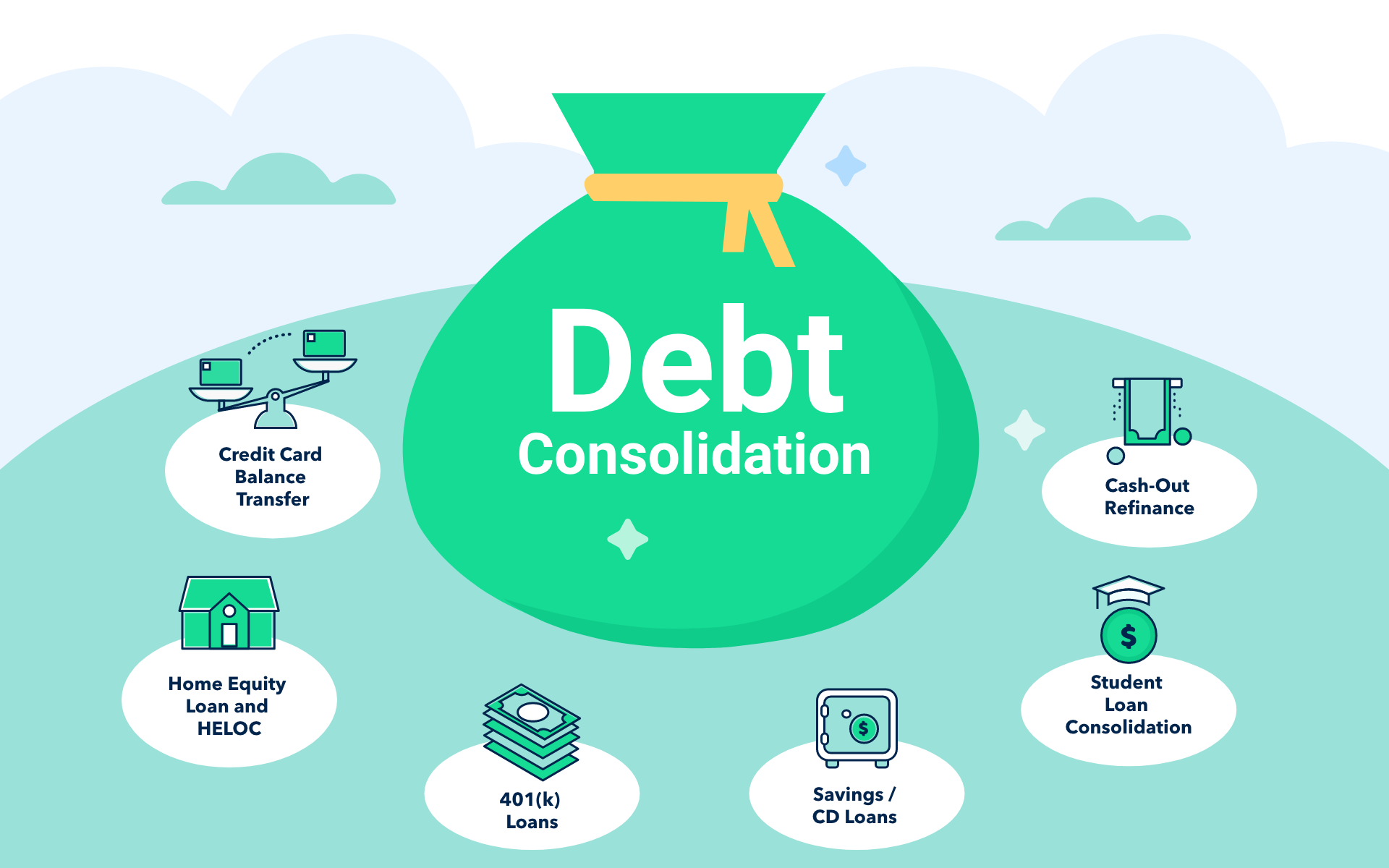For many Australians, managing multiple debts from various sources – credit cards, personal loans, or even existing online loans – can be overwhelming, leading to scattered repayment schedules, compounding interest, and significant financial stress. Online loans for debt consolidation in Australia offer a streamlined solution, allowing individuals to combine several debts into a single, more manageable loan. This strategy aims to simplify finances, reduce overall costs, and provide a clearer path to becoming debt-free. This comprehensive guide will delve into the mechanics of debt consolidation with online loans, its benefits and drawbacks, crucial considerations for eligibility, and best practices to ensure this financial strategy leads to genuine stability.
Understanding Debt Consolidation with Online Loans
Debt consolidation is a financial strategy where a borrower takes out a new loan to pay off multiple existing debts. The goal is to replace several smaller, often high-interest debts with a single, larger loan that ideally comes with a lower interest rate or more favourable terms. When this is done using an online loan, it leverages the speed, convenience, and often competitive rates offered by digital lenders.
What debts can be consolidated? Typically, online loans for debt consolidation are used to combine unsecured debts, such as:
- Credit Card Debts: Often carry very high interest rates (e.g., 15-25% p.a.).
- Existing Online Loans: Including Small Amount Credit Contracts (SACCs) and Medium Amount Credit Contracts (MACCs), which can have high effective costs (e.g., 20% establishment fee + 4% monthly fee for SACCs, or up to 48% p.a. for MACCs).
- Store Card Debts: Similar to credit cards, with high rates.
- Personal Loans: Other unsecured personal loans from various lenders.
- Medical Debts or Other Bills: Smaller, outstanding amounts.
The consolidated loan is almost always an unsecured personal loan offered by a bank or a non-bank online lender.
How Online Loans Facilitate Debt Consolidation
Online lenders have become popular choices for debt consolidation due to their inherent advantages:

- Streamlined Application: The entire application process is digital, allowing borrowers to apply from anywhere, anytime, without physical paperwork.
- Fast Approval Decisions: Leveraging advanced algorithms and automated data verification (often through secure bank statement access via Open Banking/CDR), online lenders can provide quick approval decisions, sometimes within minutes or hours.
- Rapid Funding: Once approved, funds can be disbursed rapidly, often on the same business day, allowing for prompt repayment of existing debts.
- Competitive Rates: While not always lower than traditional banks, many online lenders specialise in specific risk profiles and can offer competitive interest rates, particularly to borrowers with good credit scores.
- Comparison and Flexibility: The online nature makes it easy to compare offers from multiple lenders, finding the one that best suits your financial situation and offers features like flexible repayment terms or no early exit fees.
Key Benefits of Using Online Loans for Debt Consolidation
- Simplified Repayments: This is arguably the biggest benefit. Instead of managing multiple loans with different due dates, interest rates, and minimum payments, you have one single repayment to one lender. This significantly reduces administrative burden and the risk of missing a payment.
- Potential for Lower Interest Rates: If your existing debts (especially credit cards or high-cost short-term online loans) carry high interest rates, consolidating them into a new online loan with a lower comparison rate can lead to substantial savings over the loan term.
- Clearer Path to Debt-Free Living: A single, structured repayment plan with a defined end date provides a clearer roadmap for getting out of debt.
- Improved Cash Flow: By extending the loan term of the consolidated loan (even if the interest rate is similar), you can often reduce your monthly repayment amount, freeing up cash flow for other essential expenses or savings. However, be mindful that a longer term might mean more interest paid overall.
- Potential Credit Score Improvement:
- Reducing the number of open credit accounts and managing one loan responsibly can positively impact your credit score.
- Paying off high-utilisation credit cards can also improve your credit utilisation ratio, a key factor in your score.
- Consistently making on-time payments on the consolidated loan demonstrates responsible borrowing behaviour.
Potential Drawbacks and Risks
While attractive, online loans for debt consolidation are not without risks:
- Risk of Higher Overall Cost: If the new online loan has a higher comparison rate than your existing debts, or if you extend the loan term significantly, you could end up paying more in total interest over the life of the loan. Always calculate the total cost.
- Temptation to Incur New Debt: A common pitfall is paying off old debts with the consolidation loan and then immediately running up new debt on the now-empty credit cards or lines of credit. This creates a worse debt spiral.
- Fees and Charges: The new online loan may come with its own establishment fees, monthly service fees, or late payment charges. Factor these into your calculations.
- Impact on Credit Score (Initial): Applying for a new loan triggers a hard credit inquiry, which can temporarily lower your credit score. Multiple applications in a short period will have a more pronounced negative effect.
- No Guarantee of Approval: You still need to meet the responsible lending criteria of the online lender, including proving income and affordability. If your credit score has deteriorated or your financial situation has worsened, approval for a beneficial consolidation loan might be challenging.
Eligibility and What Lenders Look For
Online lenders assessing applications for debt consolidation loans adhere to ASIC’s responsible lending guidelines. They will typically look for:

- Stable Income: Verifiable income from employment, self-employment, or eligible government benefits to ensure you can afford repayments.
- Affordability: A comprehensive assessment of your income versus your expenses and existing liabilities (including the debts you wish to consolidate).
- Credit History: While some lenders cater to “bad credit” consolidation, a generally good credit score and a history of making payments (even if late sometimes) will yield better rates. Unpaid defaults or serious credit infringements can make consolidation challenging.
- Australian Residency: Typically, you must be an Australian citizen or permanent resident, aged 18 or over.
- Purpose: Clearly stating that the loan is for debt consolidation will help the lender assess its suitability and potentially even facilitate direct payment to your existing creditors.
Best Practices for Successful Debt Consolidation with Online Loans
To maximise the benefits and mitigate the risks of online loans for debt consolidation:
- Thoroughly Research and Compare:
- Don’t jump at the first offer. Use online loan comparison tools to compare interest rates, comparison rates, fees, and terms from multiple ASIC-licensed online lenders and traditional banks.
- Look for lenders that offer direct payment to your creditors – this ensures the old debts are actually paid off.
- Calculate the True Cost:
- Add up the total remaining cost (principal + interest + fees) of your existing debts.
- Calculate the total cost (principal + interest + fees) of the potential new consolidated loan.
- Ensure the new loan genuinely saves you money or achieves your primary goal (e.g., significantly lower monthly payments that are truly sustainable).
- Create a Strict Budget:
- Before taking out the loan, create a realistic budget that accounts for the new single repayment.
- Crucially, commit to not incurring new debt on the accounts you just paid off. Consider cutting up credit cards or closing accounts if self-control is an issue.
- Prioritise On-Time Repayments:
- Set up direct debits for the consolidated loan. Missing repayments will negate the positive impact on your credit score and incur late fees.
- Seek Financial Advice if Needed:
- If you’re unsure whether debt consolidation is the right path for you, or if you’re struggling with severe debt, consider seeking free and independent financial counselling from services like the National Debt Helpline.
- Verify Lender’s ACL:
- Always ensure the online lender holds a valid Australian Credit Licence (ACL) from ASIC. This ensures they operate under responsible lending laws.
Conclusion: A Stepping Stone to Financial Freedom
Online loans for debt consolidation in Australia offer a powerful and convenient strategy for individuals overwhelmed by multiple debts. By simplifying repayments, potentially lowering costs, and providing a clear path forward, they can be a crucial stepping stone towards financial stability. However, the success of this strategy hinges on informed decision-making, meticulous budgeting, and a firm commitment to responsible borrowing behaviours. When approached strategically, debt consolidation through online loans can significantly alleviate financial stress and empower Australians to regain control over their financial future.













